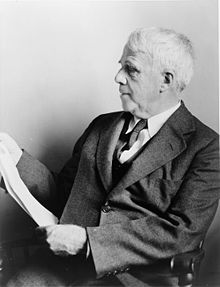Two roads diverged in a yellow wood,
And sorry I could not travel both
And be one traveler, long I stood
And looked down one as far as I could
To where it bent in the undergrowth;
Then took the other, as just as fair
And having perhaps the better claim,
Because it was grassy and wanted wear;
Though as for that the passing there
Had worn them really about the same,
And both that morning equally lay
In leaves no step had trodden black.
Oh, I kept the first for another day!
Yet knowing how way leads on to way,
I doubted if I should ever come back.
I shall be telling this with a sigh
Somewhere ages and ages hence:
Two roads diverged in a wood, and I —
I took the one less traveled by,
And that has made all the difference.
Robert Lee Frost (March 26, 1874 – January 29, 1963) was an
American poet. His work was initially published in England before it was
published in America. He is highly regarded for his realistic
depictions of rural life and his command of American colloquial speech.
[2]
His work frequently employed settings from rural life in
New England
in the early twentieth century, using them to examine complex social
and philosophical themes. One of the most popular and critically
respected American poets of the twentieth century,
[3] Frost was honored frequently during his lifetime, receiving four
Pulitzer Prizes for Poetry.
He became one of America's rare "public literary figures, almost an artistic institution."
[3] He was awarded the
Congressional Gold Medal in 1960 for his poetical works. On July 22, 1961 Frost was named
Poet laureate of Vermont by the state legislature through Joint Resolution R-59 of the Acts of 1961, which also created the position.
History
Frost spent the years 1912 to 1915 in England, where among his acquaintances was the writer
Edward Thomas.
Thomas and Frost became close friends and took many walks together.
After Frost returned to New Hampshire in 1915, he sent Thomas an advance
copy of "The Road Not Taken."
[1]
The poem was intended by Frost as a gentle mocking of indecision,
particularly the indecision that Thomas had shown on their many walks
together. However, Frost later expressed chagrin that most audiences
took the poem more seriously than he had intended; in particular, Thomas
took it seriously and personally, and it provided the last straw in
Thomas' decision to enlist in
World War I.
[1]
Thomas was killed two years later in the
Battle of Arras.
Analysis
"The Road Not Taken" is a
narrative and autobiographical poem consisting of four
stanzas of
iambic tetrameter (though it is
hypermetric
by one beat – there are nine syllables per line instead of the strict
eight required for tetrameter) and is one of Frost's most popular works.
The poem, besides being among the best known, is also one of the most
misunderstood.
[2]
The final lines "I took the one less traveled by / And that has made all the difference" are often cited
[by whom?]
as emblematic of America's individualist spirit of adventure, in a
reading that assumes they are to be taken literally.
But whatever
difference the choice might have made, it was not made on the basis of a
discerned difference between the two paths that opened up before the traveler. The speaker admits in the second and third stanzas that both
paths may be equally worn and equally leaf-covered, and it is only in
his future recollection that he will
call one of the two roads, the one he took, "less traveled by."
The "sigh" can be interpreted as one of regret or of
self-satisfaction; in either case, the irony lies in the distance
between what the speaker has just told us about the roads' similarity
and what his or her later claims will be.
Frost might also have intended
a personal irony: in a 1925 letter to Crystine Yates of
Dickson, Tennessee, asking about the sigh, Frost replied, "It was my rather private jest at the expense of those who might
think I would yet live to be sorry for the way I had taken in life."
[citation needed]
According to Larry L. Finger's analysis, nearly all critics have
agreed that the sigh represents regret as this is mirrored in the
regretful tone of the opening lines.
He quotes scholar Eleanor Sickels
as saying that the poem is about "the human tendency to wobble
illogically in decision and later to assume that the decision was, after
all, logical and enormously important, but forever to tell of it 'with a
sigh' as depriving the speaker of who-knows-what interesting
experience."
[citation needed]
Likewise, Frost's biographer Lawrance Thompson is cited as saying
that the speaker of the poem is "one who habitually wastes energy in
regretting any choice made: belatedly but wistfully he sighs over the
attractive alternative rejected."
[3]
While a case could be made for the sigh being one of satisfaction,
given the critical support of the 'regret' analysis it seems fair to say
that this poem is about the human tendency to look back and attribute
blame to minor events in one's life, or to attribute more meaning to
things than they may deserve.
[4]
Source: Wikipedia.org


